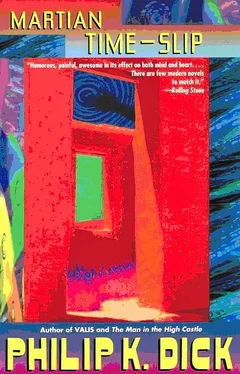I got what I wanted , he said to himself.
Now, I have to be careful, he told himself; there are some things I sure don’t want to change. I want to be sure I don’t foul up my black-market business by doing the natural thing and interfering so that old Norb Steiner doesn’t take his own life. I mean, it’s sad about him, but I don’t intend to get out of the business; so that stays as it is. As it’s going to be, he corrected himself.
Mainly I got two things to do. First, I see that I get a legal deed to land in the F.D.R. range all around the Henry Wallace area, and that deed’ll predate old man Bohlen’s deed by several weeks. So the hell with the old speculator, flying out here from Earth. When he does come, weeks from now, he’ll discover the land’s been bought. Trip all the way here and back for nothing. Maybe he’ll have a heart attack. Arnie chuckled, thinking about that. Too bad.
And then the other thing. Jack Bohlen himself.
I’m going to fix him, he said to himself, a guy I haven’t met yet, that doesn’t know me, although I know him.
What I am to Jack Bohlen now is fate.
“Good morning, Mr. Kott.”
Annoyed at having his meditation interrupted, he glanced up and saw that a girl had entered the room and was standing by his desk expectantly. He did not recognize her. A girl from the secretary pooi, he realized, come to take the morning’s dictation.
“Call me Arnie,” he muttered. “Everybody’s supposed to call me that. How come you didn’t know, you new around here?”
The girl, he thought, was not too good-looking, and he returned to his newspaper. But on the other hand, she had a heavy, full figure. The black silk dress she wore: there isn’t much on under that, he said to himself as he observed her around the side of the newspaper. Not married; he saw no wedding ring on her finger.
“Come over here,” he said. “You scared of me because I’m the famous great Arnie Kott, in charge of this whole place?”
The girl approached in a luxuriant sidling motion that surprised him; she seemed to creep sideways over to the desk. And in an insinuating, hoarse voice, she said, “No, Arnie, I’m not scared of you.” Her blunt stare did not seem to be one of innocence; on the contrary, its implied knowledge jolted him. It seemed to him as if she were conscious of every whim and urge in him, especially those that applied to her.
“You been working here long?” he asked.
“No, Arnie.” She moved closer, now, and rested against the edge of the desk so that one leg--he could hardly believe it--gradually came into contact with his own.
Methodically, her leg undulated against his own in a simple, reflexive, rhythmic way that made him recoil and say weakly, “Hey.”
“What’s the matter, Arnie?” the girl said, and smiled. It was a smile like nothing he had ever seen in his life before, cold and yet full of intimation; utterly without warmth, as if a machine had stamped it there, constructed it by pattern out of lips, teeth, tongue . . . and yet it swamped him with its sensuality. It poured forth a saturated, sopping heat that made him sit rigid in his chair, unable to look away. Mostly it was the tongue, he thought. It vibrated. The end, he noticed, had a pointed quality, as if it was good at cutting; a tongue that could hurt, that enjoyed slitting into something alive, tormenting it, and making it beg for mercy. That was the part it liked most: to hear the pleas. The teeth, too, white and sharp . . . made for rending.
He shivered.
“Do I bother you, Arnie?” the girl murmured. She had, by degrees, slid her body along the desk so that now--he could not understand how it had been accomplished--she rested almost entirely against him. My God, he thought, she’s--it was impossible.
“Listen,” he said, swallowing and finding his throat dry; he could hardly croak out the words. “Get going and let me read my newspaper.” Grabbing up the paper he held it between himself and her. “Go on,” he said gratingly.
The shape ebbed a little. “What’s the matter, Arnie?” her voice purred, like metal wheels rubbing, an automatic sound coming forth from her, like on a recording, he thought.
He said nothing; he gripped his paper and read.
When he next looked up the girl had gone. He was alone.
I don’t remember that , he said to himself, quaking inside, down deep within his stomach. What kind of a creature was that? I don’t get it--what was happening, just then?
He began automatically to read an item in the paper about a ship which had been lost in deep space, a freighter from Japan carrying a cargo of bicycles. He felt amused, even though three hundred people aboard had perished; it was just too goddamn funny, the idea of all those thousands of little light Jap bikes floating as debris, circling the sun forever. . . . Not that they weren’t needed on Mars, with its virtual lack of power sources . . . a man could pedal free of cost for hundreds of miles in the planet’s slight gravity.
Reading further, he came across an item about a reception at the White House for--he squinted. The words seemed to run together; he could hardly read them. Printing error of some kind? What did it say? He held the newspaper closer. . . .
Gubble gubble, it said. The article became meaningless, nothing but the gubble-gubble words one after another. Good grief! He stared at it in disgust, his stomach reacting; his duodenal ulcer hurt worse than ever now. He had become tense and angry, the worst possible combination for an ulcer patient, especially at meal time. Darn those gubble-gubble words, he said to himself. That’s what that kid says! They sure spoil the article in the paper.
Glancing through the paper he saw that almost all the articles devolved into nonsense, became blurred after a line or so. His irritation grew, and he tossed the paper away. What the hell good is it like that, he asked himself.
That’s that schizophrenia talk, he realized. Private language. I don’t like that here at all! It’s O.K. if he wants to talk like that himself, but it doesn’t belong here! He’s got no right to push that stuff into my world. And then Arnie thought, Of course, he did bring me back here, so maybe he thinks that does give him the right. Maybe the boy thinks of this as his world.
That thought did not please Arnie; he wished it had never come to him.
Getting up from his desk he went over to the window and looked down at the street of Lewistown far below. People hurrying along; how fast they went. And the cars, too; why so fast? There was an unpleasant kinetic quality to their movements, a jerkiness, they seemed either to bang into one another or to be about to. Colliding objects like billiard balls, hard and dangerous . . . the buildings, he noticed, seemed to bristle with sharp corners. And yet, when he tried to pinpoint the change--and it was a change, no doubt of that-- he could not. This was the familiar scene he saw every day. And yet--
Were they moving too fast? Was that it? No, it was deeper than that. There was an omnipresent hostility in everything; things did not merely collide--they struck one another, as if doing it deliberately.
And then he saw something else, something which made him gasp. The people on the street below, hurrying back and forth, had almost no faces, just fragments or remnants of faces . . . as if they had never formed.
Aw, this will never do, Arnie said to himself. He felt fear now, deeply and intensely. What’s going on? What are they handing me?
He returned, shaken, to his desk and sat down again. Picking up his cup of coffee, he drank, trying to forget the scene below, trying to resume his routine of the morning.
The coffee had a bitter, acrid, foreign taste to it, and he had to set the cup back down at once. I suppose the kid imagines all the time he’s being poisoned, Arnie thought in desperation. Is that it? I got to find myself eating awful-tasting food because of his delusions? God, he thought; that’s terrible.
Читать дальше









